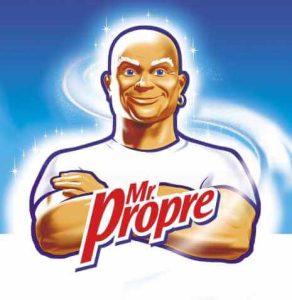
30 Nov Dirty Talk: “Clean vs. Dirty” and the Psychology of Bad Words
Cleanliness is next to godliness.
In cultures around the world, why is being clean always a seen as good thing? Why is being dirty one of our least desirable traits? The words we use are echoes of how our thought is structured — how we think at a deeper level. And how we think, even at a subconscious level, guides how we ultimately behave.
Why is this important for marketers to understand?
Many products we market have an element of “cleanliness” or “goodness” to them. By understanding that consumers use the language of scatological metaphor for things that disgust them (“a crappy day,” “he’s full of sh@@”) and terms of cleanliness for things that they perceive as good (“pure,” “fresh as a daisy,”) marketers can better understand the role that a brand plays in people’s lives and how to engage them in better brand experiences.
 The language of dirty talk, of deep metaphorical thinking, is even visible in our words for “right” and “left.” In many Indo-European languages, the word for “right” has not only a directional meaning (“take a right turn at the light”), but another meaning of “correct” (German: “recht”). In French, “Mr. Clean” is called “Monsieur Propre.”
The language of dirty talk, of deep metaphorical thinking, is even visible in our words for “right” and “left.” In many Indo-European languages, the word for “right” has not only a directional meaning (“take a right turn at the light”), but another meaning of “correct” (German: “recht”). In French, “Mr. Clean” is called “Monsieur Propre.”
Conversely, the word for “left” in these languages is often associated with evil. The Latin word for “left,” sinister, later came to mean “malicious” in Middle English. In paintings from the Middle Ages, the righteous were always on Christ’s right, while the hell-bound sinners were always on his left. The stigmatization of the left side evolved from an association with eating cleanliness (in many culture the right hand was the clean hand, while the left hand was the “toilet” hand). This association with right as good and left as evil is also prevalent in many non-Christian cultures.
Clean = Pure
 To be “clean” means to be “pure” — not only physically clean but pure of heart. In his investigation into human morality, social psychologist Jonathan Haidt shows the common deep core values that all humans (and probably primates) share around the world. In his book, The Righteous Mind, he identifies “purity” as one of these core values. Purity is a value shared by all humans and valued especially highly by people who identify as conservative. In Brandgarten’s research, we often hear consumers talk about wanting to feel clean and fresh in a way that goes beyond feeling physically clean to morally clean and pure. This thinking is also common in all world religions. Before we walk into a temple or a mosque we wash ourselves, because, God forbid, we should enter a holy place in an impure state.
To be “clean” means to be “pure” — not only physically clean but pure of heart. In his investigation into human morality, social psychologist Jonathan Haidt shows the common deep core values that all humans (and probably primates) share around the world. In his book, The Righteous Mind, he identifies “purity” as one of these core values. Purity is a value shared by all humans and valued especially highly by people who identify as conservative. In Brandgarten’s research, we often hear consumers talk about wanting to feel clean and fresh in a way that goes beyond feeling physically clean to morally clean and pure. This thinking is also common in all world religions. Before we walk into a temple or a mosque we wash ourselves, because, God forbid, we should enter a holy place in an impure state.
Clean = Healthy = Virtuous
Brandgarten recently did some global research on the mouthwash category and learned that around the world, poor oral hygiene was not only associated with bad breath but also universally a sign of bad health. The subconscious logic about oral care was that clean mouth = clean breath = healthy = virtuous. The feeling was that people with bad breath have dirty mouths and don’t care about the social norms. At a subconscious level, they were seen as unhealthy and impure (and bad potential mates)!
We have also done a lot of consumer research in the organic food category and one of the key emotional benefits that consumers derive from organics is the feeling that they are doing something virtuous. By providing their family with organic (pure) food, they are also being a good caregiver. On an archetypal level, brands that connect with consumers looking for purity are often seen as telling the “innocent” archetypal story (e.g., brands such as Method or Simple.)
I don’t feel complete
In our research, whenever we hear consumers talk about their brand and use the phrase, “I don’t feel complete,” our antennae go up. This phrase is a powerful clue that the brand plays an important ritualistic role in their lives. If the ritual is not done correctly, they don’t feel complete. Often, not feeling complete is about not feeling clean or pure. In the moisturizing category for example, a big insight was that consumers saw moisturizing as part of a cleansing, purification ritual — as a way of getting back to purity. They often used moisturizing lotions as the last step of a morning cleansing process (ritual). The morning shower routine wasn’t just helping them get physically clean, it also served to remove the negative emotions of the previous day, so they could “start fresh.” The moisturizer in our study was an important “prop” in the ritual of helping them feel clean. 
Order vs. Chaos
From research we have done in the faucet category, we know that the act of cleaning a sink or a kitchen also helped homeowners feel clean on the inside. It provided a tremendous relief when their house was now presentable to visitors. There was a virtuous morality and a peace of mind in having a clean house. “It’s that feeling of having all your cups put away in the cupboard.” Cleaning was a way of constantly pushing back against the entropy of chaos for a more orderly world.
Words Underlie Deeper Thought Structures
The language we use is a powerful clue to the way we structure and see the world. When consumers use the language of “dirty” they often mean this is something that is bad or threatening to them. When they speak of something that is “clean, fresh, or pure,” they are usually referring to something they see as morally virtuous. As marketers, understanding these underlying codes can help us be much more empathetic and effective.
 Fritz Grutzner is president and founder of Brandgarten, a firm that specializes in uncovering the emotional drivers behind consumer behavior and using deep human insights to build powerful brand strategies. He can be reached at fgrutzner@brandgarten.com.
Fritz Grutzner is president and founder of Brandgarten, a firm that specializes in uncovering the emotional drivers behind consumer behavior and using deep human insights to build powerful brand strategies. He can be reached at fgrutzner@brandgarten.com.


